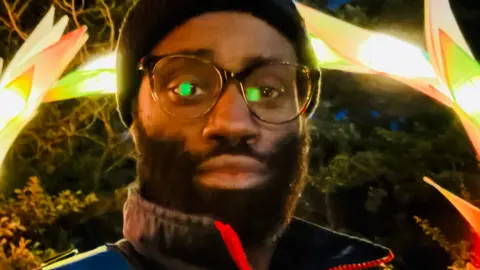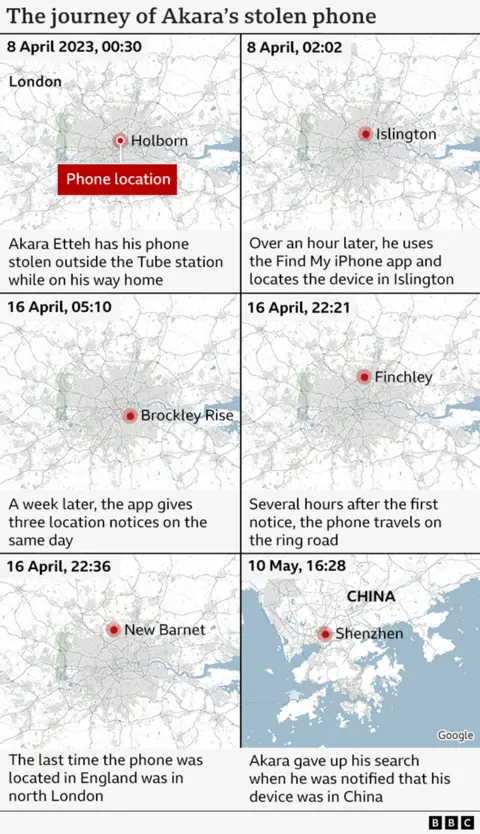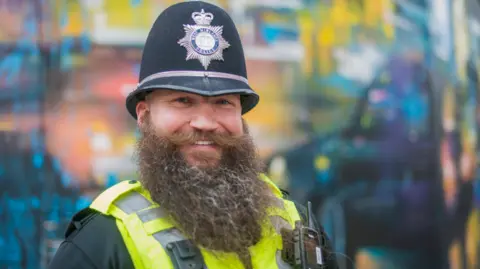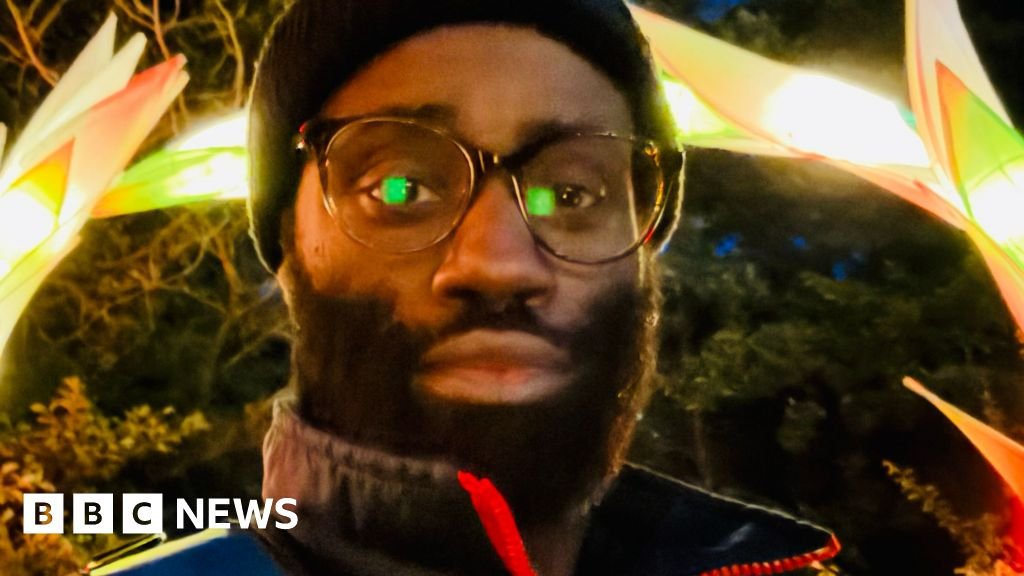 Ett brand
Ett brandAkara Etteh was checking her phone as she stepped out of Holborn Underground Station in central London on a Saturday morning in April.
Moments later it was in the hands of thieves on the back of an electric bike – Akara gave chase but they got away.
He is just a victim An estimated 78,000 “grab and grab thefts” In the year to March, infection rates in England and Wales had increased significantly compared to the previous 12 months.
Prosecution rates for such crimes are low – police say they are targeting criminals but cannot “arrest their way out of the problem”. They also say manufacturers and technology companies could play a bigger role.
Crime victims have told the BBC about the impact it has had on them – from losing irreplaceable photos to having tens of thousands of pounds stolen.
For Akara, like many others whose phones have been stolen, there was another frustrating thing: He could track where his device had gone, but he had no power to get it back.
Telephone ringing tones around London
When he returned home about an hour later, he put his iPhone 13 into lost mode – meaning the thief couldn’t access its contents – and turned on the Find My iPhone feature using his laptop.
Akara was able to track the approximate location of his phone, and he was notified almost immediately that it was in Islington. Eight days later, it was picking up a signal from a different location in north London.
In hindsight, he said he “did not recommend” taking that action and he went to the two locations where the phone was located to “look around”.
“It was very dangerous,” he said. “I was full of adrenaline and anger.”

He didn’t speak to anyone, but he felt like he was being watched, so he went home.
“I’m really angry,” he said. “Cellphones are expensive. We work hard to earn money to afford them, and people say ‘screw it.'”
Then, in May this year, just over a month after the theft, Akara checked Find My iPhone again — his prized possession was now on the other side of the world, in Shenzhen, China.
Akara gave up.
It is not uncommon for stolen phones to flow into Shenzhen – if the device cannot be unlocked and used again, They are disassembled into parts.
The city, with a population of 17.6 million, is a large technology hub sometimes referred to as China’s Silicon Valley.
Police unable to help
Shortly after Akara’s phone was stolen, he saw police on the street and told them what had happened. He said officers knew the thief would “go around the area” to steal phones and encouraged him to report the crime online, which he did.
A few days later, Scotland Yard emailed him to inform him that the case had been closed because it was “unlikely that we could identify the person responsible”.
Akara then submitted photos and information collected from the location of the stolen phone. Police acknowledged receipt of the photos and information, but took no further action.
The Metropolitan Police declined to comment on Akara’s specific case but said it was “delivering resources to hotspots such as Westminster, Lambeth and Newham, increasing patrols and plainclothes officers to deter criminals and make police more visible to community members”.
Mom’s photo is missing
Many people have also told the BBC about their experiences with stolen phones. One of them is James O’Sullivan, 44, from Surrey, who said thieves used the Apple Pay service on his stolen phone to cost him more than £25,000.
Meanwhile, Katie Ashworth from Newcastle explained that her phone was robbed in the park along with her watch and debit card in the case.
The 36-year-old said: “The saddest thing is that the phone has the last pictures of my mum taken on those walks before she became too ill to do anything – I would do anything to get those pictures back.”
She said police once again failed to take action.
“The police never followed up with me, even though my bank transaction records clearly showed where the thieves had gone,” she said.
“The police just told me to check Facebook Marketplace and local second-hand stores like Cex.”
Police’s race against time
So why do police seem unable to crack down on this crime, or recover stolen devices?
Constable Mat Evans, who leads a team at West Midlands Police dedicated to tackling this type of crime, admitted that only a “fairly small number” of stolen phones are actually recovered.
He said the problem is that criminals act so quickly.
“Within hours, the phones would be moved to known enclosures,” he said.
“It’s always a battle against time after any crime of this nature occurs, but people should report these things to police because if we don’t know these crimes are happening we can’t investigate.”
Sometimes just one arrest can make a difference.
“When we catch these criminals, whether at the scene of the crime or afterward, our crime rate goes down,” he said.
“A lot of times, this person is responsible for a large number of crimes.”
But the problem is not just about policing.
The National Police Chiefs’ Council, which brings together senior officers to help develop policing strategy, will “continue to target” the most aggressive criminals, Commander Richard Smith said in a statement.
“We know we can’t solve this problem by arresting people,” he said.
“Manufacturers and the technology industry have an important role to play in reducing the opportunities for criminals to profit from reselling stolen phones.”
Tracking and Disabling
 Matt Evans
Matt EvansStolen phones can already be tracked and their data wiped through services like Android’s Find My iPhone and Find My Device.
But Police Minister Dame Diana Johnson said this week the government wants manufacturers to ensure any stolen phones can be permanently disabled to prevent them being sold second-hand.
The police chief will also be tasked with gathering more intelligence on who is stealing phones and where the stolen devices end up.
The government said growing demand for second-hand mobile phones in the UK and abroad was believed to be the main reason for the recent increase in thefts.
The Home Office will host a summit asking technology companies and phone makers to consider innovations that could help stop the illegal trade in mobile phones.
Officer Evans said that while there was “no silver bullet”, one thing manufacturers could do that would be “a big help” to police was to enable more accurate tracking.
“Phone tracing is OK as far as it goes,” he said.
“But it’s not yet that scene in Total Recall where you’re running around with a tracking device in your hand, chasing a little dot down the road.
“I know it’s difficult for the phone company to make a request like this, but from a policing perspective it would be very helpful.”
Apple and Android did not provide a statement to the BBC, but Samsung said it was “working closely with key stakeholders and authorities on the issue of mobile phone theft and related crime”.
Additional reporting by Tom Singleton

